From The Horse's Mouth: Charles Cure and Jordan Cozza (HUSH.) on Unexist
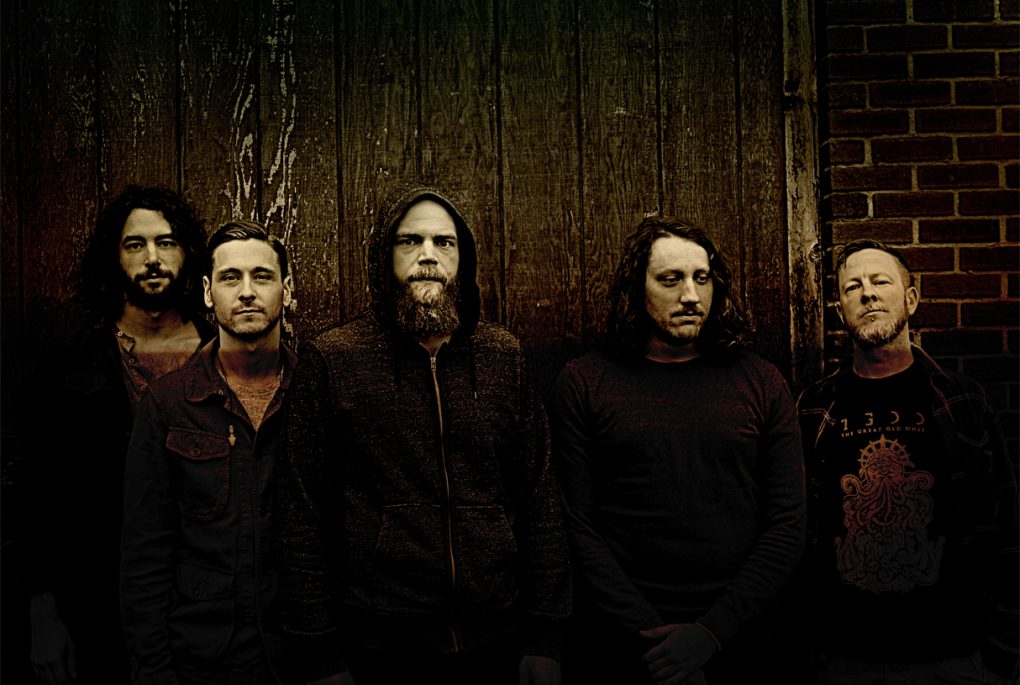
From Albany, New York, HUSH. announces the June 24 release of its first full-length album, Unexist. Unexist was engineered by Ryan Slowey, mixed by Kowloon Walled City frontman Scott Evans (Old Man Gloom, Ladder Devils), and mastered by From Ashes Rise frontman Brad Boatright (Nails, Tragedy).
Like the best bands of its genre, HUSH. excels in the art of momentum – to listen to Unexist is to witness an inevitable force, advancing slowly, unstoppably. It is hypnotic in its motion. Indeed, frontman Charles Cure refers to the band more as a collective force than a group of individuals.
An apt reference point is Times of Grace-era Neurosis, with its tribal drums and end-of-world intensity. Like Neurosis, HUSH. is a band in the sludge-doom realm, whose roots lie in hardcore. Frontman Charles Cure sang for Equal Vision Records band Endicott, guitarist Jeff Andrews was an early member of From Ashes Rise, and the rhythm section of Nick Warchol and Mark O’Brien also does time with Deathwish Inc signees Self Defense Family. Fleeting moments of brightness on Unexist point to influences from farther afield – the band name-checks Depeche Mode and Godspeed You! Black Emperor as influences, alongside more predictable doom, crust, and hardcore bands.
Ghettoblaster recently caught up with HUSH.’s Charles Cure and Jordan Cozza to discuss the record. This is what they shared about it.
When did you begin writing the material for Unexist?
Jordan: Pretty much immediately after we finished recording our demo. We were keeping our shows pretty scarce at the time so we were always trying to have new material whenever we played out.
Charles: Yeah also, I think the songs really began coming together a few months later when we added Baird, who played bass on Unexist and wrote the record with us. We hadn’t had a bass player up to that point, and it added some depth to the songs.
What was the most difficult song to take from the initial writing stage through recording and mixing? Why was it so troublesome?
Jordan: I can’t really think of any particular song that we struggled with during the recording process. We practiced a lot and went into the studio prepared. As far as writing, I’d say “We Left Like Birds,” the third song on the record, was the song that took us the longest to solidify.
Charles: Yeah, the third song has a riff that Jordan wrote that just melted everyone’s brain for about a week or two and then suddenly we just locked in on it and didn’t have much trouble from there. We were pretty much on the same page throughout the writing process, so it was actually relatively quick and efficient.
Which of the songs on the record is most different from your original concept for the song?
Jordan: ”Infinite Recursion” is the first track that comes to mind. When writing that song the thought was “this is where we give the album a breather. We’ll throw in a more mellow song to give the listener’s ears a break”. After it was recorded, we listened back and were kind of surprised by how heavy it actually turned out.
Did you have any guest musicians play or sing on the record?
Charles: No, it’s just us in there. We had some ideas for that but ran into the typical time/budget constraints that a self-financed recording usually does, so we weren’t able to do it. It wasn’t major additions we had planned but it’s always nice to have some friends come and jam on your record and give it a little extra texture. Maybe next time we will get the chance.
Who engineered and/or produced the record? What input did these people have that changed the face of the record?
Charles: Ryan Slowey engineered the record at a studio called Black Dog in the woods of upstate NY. He is a good friend of ours and plays in a band called Maggot Brain that we jam with frequently. He recorded our first record as well, and was cool enough to drag all of his shit into a decrepit warehouse for that, so an actual studio was an easier setting for him this time. The tracking process was relatively straightforward, because we knew going in that we were working with limited time and money, so we made sure we knew how to get what we wanted as far as sounds without messing around too much. Slowey did an awesome job of really just nailing down what we sound like live on the recording, and it helps that he has seen us play live enough to know what that should be. Also, Scott Evans at Antisleep was super accommodating and magical at achieving a gross, gritty mix for us even though he was doing it from thousands of miles away. Brad Boatright at Audiosiege also exceeded basically every expectation I had in terms of a finished, mastered version of the record. Definitely without those three dudes and their insight and input, the record would not be what it is.
Is there an overarching concept behind your new album that ties the record together?
Charles: Yeah, the record is about death and dying, and various perspectives on and interpretations of that. When we started writing, the songs seemed to have a bleak and desolate mood that lends itself to that subject matter and lyrically I wanted to do something different by not writing songs that were about me personally. So I focused on human perceptions of death and its meaning and how that has manifested itself in art, music, film, media. I found source material that I thought was compelling and then tried to reinterpret or reflect the meaning or experience represented in them. I think it turned out to be interesting because it forced us to write in a way that made the songs come together in a general way, but still allowed each one to be its own self-contained idea.
Have you begun playing these songs live and which songs have elicited the strongest reaction from your fans?
Charles: We have been mixing the songs into our sets in various configurations over the past year or so. I’m not sure which ones people like the most, yet. If I had to pick one, I’d say “Eater of All Things” probably, because we’ve played it the most consistently for the longest and people have probably started to recognize it.
(Stream HUSH.’s “Eater of All Things,” off Unexist, exclusively on American Aftermath.)



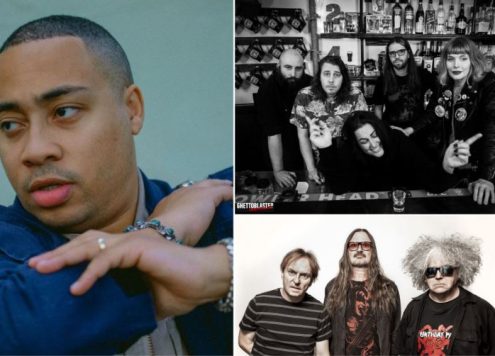


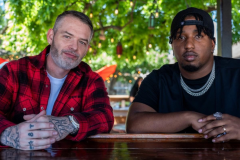



Social Media